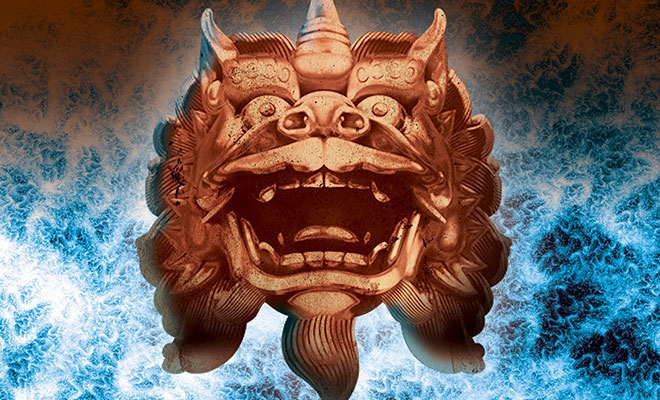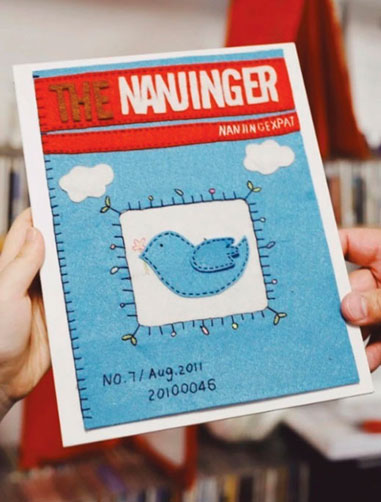One touch on the Pixiu head, one’s life will be worry free. Pixiu facing bank, one’s life will have ample money to spend. Luck comes with a Pixiu on hand, home prosperous with a Pixiu on stand.
In China it is said the 9th son of Dragon defecated on God’s floor, violating the law of heaven and seriously upsetting the Jade Emperor, who then (as a punishment) sealed up his bottom and restricted his diet to gold, silver or jewels only. And so as legend would have it, this is the earliest story we have as to the beginnings of Pixiu; the non-pooping, mystical guardian protector of wealth.
From thenceforth, Pixiu (貔貅) has played a pivotal role in Chinese myths involving wealth and good fortune. Identifying Pixiu can sometimes see it mistaken with the stone lion. One must look for the head of a dragon (龙龙), and the body of a lion (狮), for Pixiu is a ferocious creature that stands proud alongside the dragon, phoenix, turtle and qilin, together making up the five mythical creatures of China.
Pi (貔, a.k.a. Tianlu; 天祿 天祿) is male; he has one antler. Xiu (貅, a.k.a. Bixie; 辟邪) is female and she has two antlers. Tianlu is in charge of wealth and the collection thereof. Bixie wards off evil and assists those suffering from bad fengshui. While the male side of Pixiu is said to bring wealth to its master, the female side is said to hold on to that the male has gathered. It was the Qing dynasty that altered the appearance of Pixiu, making him fatter, stronger and rounder so that his stomach shall be filled with endless wealth.
In China, those said to be going through a bad year will especially draw strength from Pixiu, who is said to possess mystical powers that pull in all manner of Cai Qi (財氣; wealth).
Nanjing people are more than familiar with Pixiu. Bartender, Yullen Yu, commented, “Pixiu is Nanjing’s heritage, he can bring you luck and protect you against bad things happening. If you are a businessman you will have Pixiu, he will help bring you money. My mother and relatives buy small jewelry pieces of Pixiu”.
In fact, locals are particularly fond of Pixiu; as a visitor to this ancient capital, you have most definitely encountered it at some point. Perhaps guarding the entrance to a bank, tomb or the train stations, or even dangling around someone’s neck or wrist. Just as the saintly presence of Mary Magdalene looks down upon the people of Rome; Pixiu is here, everywhere, looking over the people of Nanjing.
“Pixiu was dug up from underground a long time ago. During the Yuan Dynasty, Emperor Zhu Yuanzhang renamed Nanjing’s Buddhist temple, where Pixiu was found, [as] Linggu Temple. He made the biggest Pixiu in China and after that from all over donations came to China… Pixiu can have benefits and negatives, [but] not everybody uses Pixiu, however”, Yu added.
Indeed, Linggu Temple is the place to go to learn more about Pixiu, where it eternally sits guarding the entrance. Surrounded by forrest and seemingly well kept, considering it dates back to the Liang Dynasty (502-557), the temple is a place where the tranquil pondering of mystical ancient China can be done.
Said to be a bold creature that is loyal and obedient, Pixiu also has supernatural powers that enable it to protect against natural disasters and in times of war. According to blogger Yu Tuan Lu, “Pixiu [was] totem of two clans in the ancient times. Legend has it that Pixiu assisted emperor Yan and Emperor Huang in war”. Pixiu’s open mouth that bares large fangs is said to be used to attack evil spirits draining their soul and turn it into wealth. Pixiu guards against disease threatened by said souls. Its ability to gobble up and attack evil and its general ferociousness made Pixiu the ideal guardian on the battlefield in ancient China; hence its long standing connection with the army.
Local businesswoman, Joyce Zhang, told The Nanjinger, “Pixiu is only used by businesspeople…it dates as far back as the Tang Dynasty which was before the Song, the Yuan, the Ming and the Qing Dynasties; that’s how far back its connection with Nanjing started and has remained”.
In ancient China, Pixiu could be seen on the four corners of the roofs of important people and was used to guard important tombs.The statues of Pi and Xiu would guard the entrance to the tomb to ward off evil and protect wealth. Around Nanjing sits at least 34 such Pixiu tomb guardians, with some dating back to the Nan dynasty.
These days in Nanjing, and around the world, Pixiu is featured everywhere; in Disney’s “Ducktales” as the gold monster, in the slot machine game Pixiu by Arrow’s Edge, and even as the British Columbian occupational, health and safety company Pixiu Safety. Pixiu has become a modern day, internationally recognised symbol of health, wealth and happiness, with its roots in humble old Nanjing.











